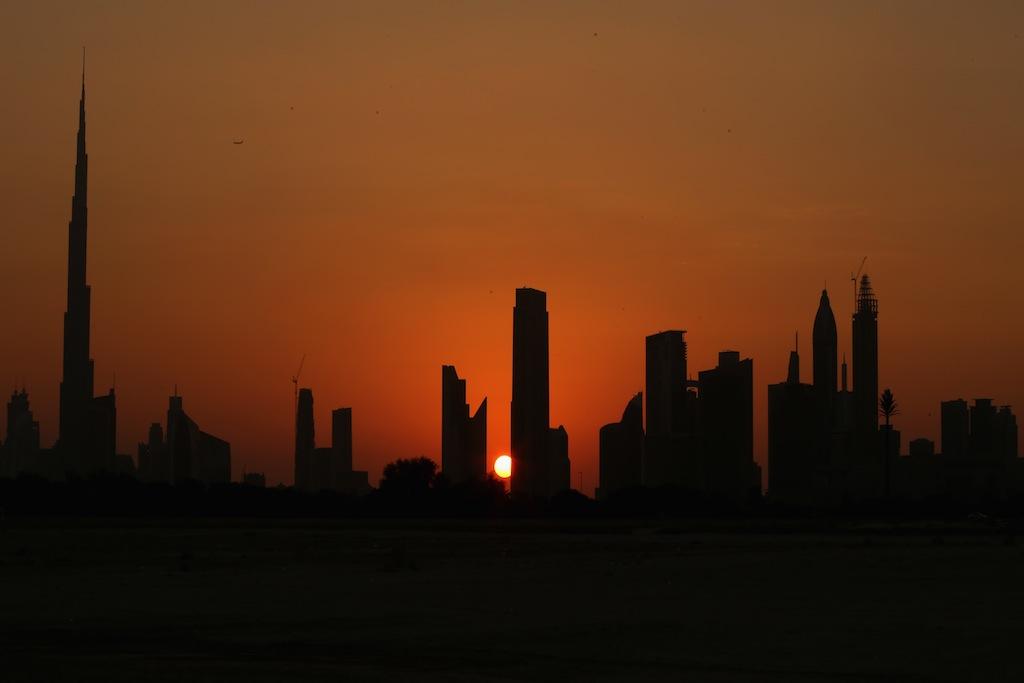Why does US tolerate unjust imprisonment of an American citizen in the United Arab Emirates?
The sun sets behind the city skyline of Dubai on November 16, 2013 in Dubai, United Arab Emirates. Dubai is recovering from its slump during the global financial meltdown.
DUBAI, United Arab Emirates — It continues to remain unclear why the Obama administration has been unwilling to intervene on behalf of an American citizen unjustly incarcerated here, a country that can best be described as a United States client state. How would US strategic interests be harmed in the United Arab Emirates (UAE) if it more forcefully demanded the release of US citizen Zack Shahin.
After all, Gulf Arab states, fearful of Islamic terrorism and distrustful of Iran’s great power intentions and nuclear ambitions, are more reliant on the US than the US on them. Washington possesses the ability to chart a more independent foreign policy with the shale gas revolution reducing US reliance on imported energy from the Middle East.
Zack Shahin is a former CEO of Deyaar, a real estate services company. He was arrested on trumped up charges of embezzlement in March 2008 during the global financial meltdown and became a scapegoat for the UAE’s poorly crafted economic and fiscal policies.
The Western media routinely vilify authoritarian regimes in Eurasia, especially after Russian President Vladimir Putin’s annexation of Ukraine’s Crimea region, while using kid gloves when talking about the more authoritarian UAE. The UAE is defined as “not free” by the Washington-based human rights think tank Freedom House, whose 2012 report talked of growing suppression of political dissent.
Shahin began a hunger strike on March 3 to call attention to his plight. He has been imprisoned for five years without trial in inhumane conditions and with gross violation of due process of his rights. He and his family have been forced to sign documents in Arabic that they do not understand and their house has been ransacked by security officials and items stolen.
The UAE authorities have made it up as they have gone along, adding new criminal charges as older ones have failed to produce desired outcomes. Poor or non-existent medical care has led to a deterioration of his health; high blood pressure and a stomach ulcer have been made worse by his incarceration.
In March 2013, Shahin was acquitted on the most important first of five charges but nevertheless sentenced to 15 years imprisonment. These charges were subsequently overturned by the Court of Appeals in November. The case then went to the Court of Cassation, which is the highest court in the UAE and hears disputes on matters of law. This court upheld the non-guilty verdict.
Shahin remains an example of selective use of justice incarcerated in the UAE.
The tragic reality is that the US is more forceful in focusing on political conditions and authoritarianism in Russia and Eurasia than interceding on behalf of one of its own in the UAE.
Clearly, the US approach of restricting intervention to behind-the-scenes private complaints has failed. The UAE, highly dependent on US strategic support in a volatile region of the world, will only be responsive to strong and critical public statements condemning the selective use of justice against US citizens such as Shahin.
President Obama should be aggressively working towards release of Zack Shahin, who has been incarcerated so long without due process and the rule of law.
Taras Kuzio is a non-resident fellow at the Center for Transatlantic Relations, School of Advanced International Relations, Johns Hopkins University in Washington DC. He has been involved in democracy and human rights affairs for three decades.
Every day, reporters and producers at The World are hard at work bringing you human-centered news from across the globe. But we can’t do it without you. We need your support to ensure we can continue this work for another year.
Make a gift today, and you’ll help us unlock a matching gift of $67,000!
